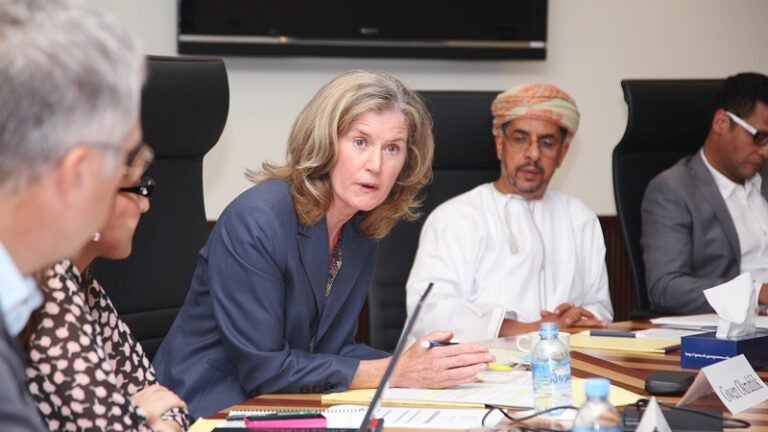Focused Discussions, Regional Studies
Sectarian Politics in the Gulf Working Group I

On October 9–10, 2011, CIRS convened the first of its “Sectarian Politics in the Gulf” Working Group meetings. Participating in the research initiative were several experts on the issue of sectarian politics in the Middle East region in general and the Gulf in specific. This first gathering took the form of a brain-storming session, where the participants debated the importance of overall thematic issues pertaining to the project. One of the main objectives for the meeting was to identify gaps in the literature. Although sectarian issues are not new to this region, exclusive and detailed academic studies are still lacking and need to be addressed. Often, there are individual studies written on individual countries, but an overall comprehensive look at sectarianism in the Gulf is glaringly lacking. For many people in the Gulf region, sectarianism is still a taboo subject and so has not been addressed with the necessary academic rigor. At the conclusion of the research initiative, each participant will write a paper on their particular field of expertise. CIRS will gather these individual papers and prepare them for publication.
One important issue that was raised was contestation regarding the term “sectarianism” and whether or not this should be qualified and broadened to include “identity politics,” as ethnicities and tribal linkages are often bound up together. Although each of these has a different set of variables, they are difficult to separate along clear lines. Traditionally, sectarianism has had negative connotations in its ability to segregate people along religious lines. To unpack the term, it is necessary to submit to the idea that any form of identity, whether sectarian or otherwise, is always fluid, negotiated, and changes from one area to another and one historical period to another.
The participants agreed that it was important to point to how sectarianism can be politically manipulated and how governments or others have had a direct hand in quelling or inciting sectarian strife at particular historical periods. Sectarianism therefore, plays a crucial role in the politics, economy, and social infrastructures of most, if not all, countries in the Gulf. As such, some of the speakers argued for the need to locate sectarianism – as we understand it today – in its historical context to question whether it is a modern phenomenon that has its roots in colonial exploitation of regional differences or a feature much more ancient. Such segregation based on sectarian identification has had lasting effects, especially in the Gulf region, on rentier politics regarding how a state’s wealth is distributed and to which sectors of society.
The obvious sectarian struggles in the region play out between the Shia and Sunni communities as they vie for political power. However, the participants argued that it was important not to view these as homogenous entities, but to point to their internal differences. Further to examining the more prominent sectarian divisions, the participants argued for the need to highlight some of the less visible sectarian struggles that have been taking place for many years and that go undetected by the larger power players. For example, there are very few studies on the socio-politics of minority groups such as Sunni and Jewish communities in Iran.
Other issues, such as how sectarianism can be a transnational as well as international concern were clearly demonstrated with the US invasion of Iraq in 2003 and the political turmoil that ensued affecting domestic, regional, and international relationships. Currently, in the wake of the Arab Spring, with rise of new media and social networking, the idea of a more globalized world has been created, but it is also one where people are more aware of their differences. In Bahrain, for example, sectarian struggle has become top of the agenda of political discourse in the Gulf as other countries with the same sectarian divisions attempt to pacify or coerce the subversive elements in their societies.
These are just some of the issues that the participants addressed over the two-day meeting and which they will narrow down over the course of their next visits to CIRS and the Georgetown University in Qatar campus.
- Click here for the working group’s agenda
- Click here for the participants’ biographies
- Read more about the research initiative
Participants in the “Sectarian Politics in the Gulf” research initiative are:
Rogaia Abusharaf – Georgetown University School of Foreign Service in QatarMohammad Akbar – American University of KuwaitAbdulaziz Al Fahad – Kingdom of Saudi ArabiaMohammed Al Ghanim – Georgetown UniversitySultan Al Hashmi – Sultan Qaboos UniversityGhanim Al Najjar – Kuwait UniversityZahra Babar, CIRS, Georgetown University School of Foreign Service in QatarLois Beck – Washington University in St. LouisJohn T. Crist – CIRS, Georgetown University School of Foreign Service in QatarKristin Smith Diwan – American UniversityMichael Driessen – CIRS, Georgetown University School of Foreign Service in QatarKhaled Fattah – Lund UniversityFanar Haddad – University of LondonMehran Kamrava – CIRS, Georgetown University School of Foreign Service in QatarLaurence Louer – CERI, FranceMari Luomi – CIRS, Georgetown University School of Foreign Service in QatarRoel Meijer – Radboud University, The NetherlandsSuzi Mirgani, CIRS, Georgetown University School of Foreign Service in QatarGwenn Okruhlik – Trinity UniversityLawrence Potter – Columbia UniversityGuido Steinberg – German Institute for International and Security Affairs
Article by Suzi Mirgani, CIRS Publications Coordinator